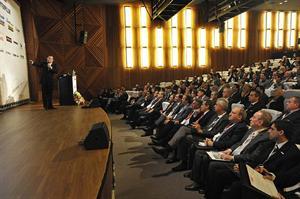Publicado em 22 de outubro de 2012 por Mecânica de Comunicação
Former Finance Minister of Brazil is optimistic with regard to investments in infrastructure
Mailson da Nóbrega is one of the guest speakers at the III Sobratema Forum Brazil Infrastructure.

The program of investments in infrastructure that was recently announced by Brazil’s federal government should contribute to an increase in the productivity and competitiveness of the country’s economy, enhancing its potential for growth, if it is appropriately conducted. This brief assessment of such government measures was made by economist and former finance minister Mailson da Nóbrega, one of the guest speakers at the III Sobratema Forum Brazil Infrastructure – Technology and Innovation, an initiative of Sobratema - the Brazilian Association of Technology for Equipment and Maintenance, which will take place next October 30th at Fecomércio in the city of São Paulo.
In the former minister’s opinion, the deterioration of Brazil’s infrastructure is one of the main reasons for the loss of competitiveness of Brazilian industries and the decline in the dynamism of the economy. “Brazil must annually invest around 5% of its GDP to maintain and improve the quality of its infrastructure, particularly in the area of transport infrastructure. The public sector invests little over 2% of the GDP; and poorly. Thus, the importance of attracting capital and private management to ten sector,” da Nóbrega observes. To him, the recent measures “are a break with the bias against privatization of infrastructure - a characteristic of the PT party’s politics - and clear the way for a reduction in bottlenecks that inhibit the smooth running of logistics”.
In addition to expanding investments to improve the country’s overall structure, Mailson da Nóbrega also believes that it is crucial to address the tax problem and establish basic education as a priority. “The problem is that this is easier said than done,” he comments. As he sees it, the main reform needed to boost growth, i.e. the tax reform, stands little chance of being accomplished in this government’s term of office, since it requires the mobilization of governors and political leaders. “Such leadership is not available at this time,” says da Nóbrega, adding that what we may continue to see is ‘patch-ups’ rather than a reform.
As regards the preparation and education of the people, the former minister believes that the nation needs a “revolution in education”. “Corporate resistance is very strong and Brazil has not yet rid itself of the idea that it is best to invest in higher education. While such investment is important, experiences and examples of success demonstrate that quality at the elementary and high school levels is the key to improving the quality of education. Herein, we see a reversal of priority,” he adds.
Despite this situation, Mailson da Nóbrega points out that today Brazil enjoys a privileged position in the world, which can help in balancing and addressing all these points. Regarding the effects of international crises, da Nóbrega, who will speak at the III Sobratema Forum, understands that today the country is less vulnerable to crises than in the past. “We have a solid financial system, macroeconomic stability and a robust ‘cushion’ of international reserves, which exceed the country’s foreign debt. We are creditors to the rest of the world; an unprecedented situation,” concludes the former minister.
The III Sobratema Forum Brazil Infrastructure – Technology and Innovation has scheduled another seven presentations for this event which is directed to all the professionals in the construction business chain and in the areas of research, development and innovation.
Registration is available at Forum’s official website: www.sobratemaforum.com.br. Seating is limited.

Av. Francisco Matarazzo, 404 Cj. 701/703 Água Branca - CEP 05001-000 São Paulo/SP
Telefone (11) 3662-4159
© Sobratema. A reprodução do conteúdo total ou parcial é autorizada, desde que citada a fonte. Política de privacidade


